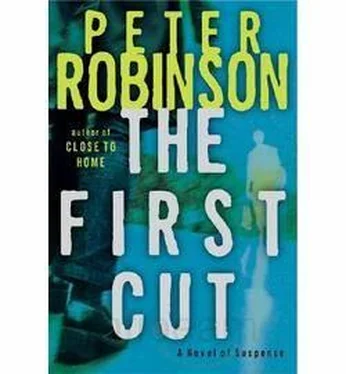Her parents had never visited the room-or even the city-before. The rough-and-ready atmosphere and basic living conditions must have been just as much of a shock to their tender southern sensibilities as they had been to hers at first. Over two years, though, she had had a chance to get used to it. At her age, too, she was more concerned about parties, books, films, plays and love than she was about living in a spotless mansion. Unlike her mother, Kirsten had never been particularly house-proud. Even her room at home had always been a mess. Surfaces hadn’t mattered too much as long as she had been having fun. She washed the dishes regularly, dusted and went to the launderette once a week: that was it. Besides, these houses were so old and decrepit you couldn’t do much with them even if you tried. They were only temporary: places to pass through, not to make nests in.
Sarah came back with the cracked teapot and three mugs. Kirsten’s father accepted his sugarless tea graciously, and her mother continued to stand like a statue by the window. Her father made small talk with Sarah while Kirsten made a pretense of searching the room for the things she was supposed to want. She picked up the small pile of mail-mostly junk-from the desk and shoved a few clothes and a random selection of books into the old suitcase in the cupboard. Then she sat down to finish her tea, which had cooled by then.
“Is that all you want?” Sarah asked.
“For the moment. I’ve got plenty of stuff back home-clothes and that.”
“But the books…?”
“Hang on to them for me, will you? I think I need a rest from literature.”
Sarah eyed the shelves, still more than three-quarters full. “I suppose it’s about time I read Shelley and Coleridge,” she said, smiling. “Though I’d planned on a summer with Thomas Hardy and George Eliot. I don’t know about the linguistics and phonetics stuff, though. You know I never could understand all that.”
Kirsten shrugged and took one book down for her. “That’s a good one. The prof who wrote it is supposed to be able to tell what village you come from just by your accent. They say he’s usually accurate within ten miles or so. I never got as good as that, but…”
“Thanks,” said Sarah. “I’ll give it a try.”
They must all, Kirsten thought, be conscious of her mother looming over them, radiating waves of discomfort. Were the circumstances different, she might have gone into one of her “Why did you have to leave a clean, decent home?” spiels. Even her father might have reminded her of how he had tried to persuade her to go to a university closer to home instead of moving so far away. But she’d had to fly the coop. She knew she wouldn’t have been able to stand living at home while all the other students were free to live their own lives for the first time. How humiliating it would have been to have to run off back to Mummy and Daddy’s in time for tea after the Milton lecture. And the further the better, she had thought, while offering convincing arguments about the quality of teaching and the reputations of professors.
“I think we really should go, dear,” her father said finally, looking for somewhere to put down his mug.
Kirsten got up, took it from him and carried it into the kitchen. She was ready, too. She’d had enough of this tension and pretense. If everyone was going to treat her as if she were made of glass for the rest of her life, then she wanted out. She began to get an inkling of what the physically handicapped must feel like: everyone acting so embarrassed, condescending and pitying, and trying so hard not to offend them or refer to their disability in any way. Sex and babies would now be unmentionable subjects back home, she realized, along with all the other dirty words. Taboo. “Don’t mention you-know-whats,” her mother would whisper to visitors at the door, “or you’ll upset poor Kirsten.” She was tired. All she wanted to do was crawl in the back of the car and be chauffeured home quickly and quietly.
Sarah came down the stairs with them and hugged Kirsten again on the doorstep. “Don’t worry,” she said, “I’ll take care of everything. Oh, I forgot, what about your tapes?”
“It’s all right, Sarah, you hang on to them. I’ve got as much music as I want at home.” And it was true. She had a deluxe stereo in her spacious bedroom, the one her father had bought her for her eighteenth birthday. It was too bulky and expensive to cart all the way up to university, so she had made do with the portable system and kept the other at home to enjoy on holidays.
Sarah said she would write soon and come down to visit when she could, and with that they were off. Necks craned behind windows to watch them go. Perhaps, Kirsten thought, it’s not so much the posh car as her new celebrity status: “There’s the girl that nearly got herself killed by that maniac,” they would be saying to themselves. How odd the words sounded in her mind: “Got herself killed.” As if what happened had been, somehow, her own fault.
Her mother was clearly relieved to be out of the room and back in the more congenial and appropriate environment of the Mercedes. The two of them had, her father told her, been staying in the big hotel near the station all the time she had been in the hospital. Poorer or less powerful people, Kirsten knew, would have been able to spare neither the time off work nor afford the luxury. She had always taken her family’s wealth and status for granted, as the young do, but now, for the first time, she was conscious of privilege: the private room in the hospital; the family home, a renovated Tudor mansion in Brierley Coombe, near Bath; and the comfortable Mercedes that glided down the M1 toward it.
Through a thin drizzle, she watched the dull South Yorkshire landscape of slag heaps and motionless pit wheels flash by, and soon they were passing turnoffs for Nottingham and Derby. Kirsten’s father was a motorway driver as a rule; even if it meant more mileage, he would generally stick to the motor-ways and drive as fast as he could get away with. But this time, she realized, as he turned off the M1 near Northampton, before it swung southeast toward London, they were taking the scenic route. Perhaps he thought a good dose of the green and pleasant land would prove therapeutic. As if to prove the point, the rain slackened off and the sun burst through before they had even skirted the south Midlands.
Kirsten was comfortable in the back. The Mercedes seemed to float on air without making a sound, and after a few attempts at making conversation, her parents had fallen quiet, too. Her father switched on Radio Three and Kirsten relaxed to the Busoni piano music that was playing. They passed through Banbury and Chipping Norton and soon entered the Cotswolds. By then, it was indeed a perfect day in the English countryside: blue sky, one or two fleecy white clouds drifting over, rounded green hills and quaint villages. Sunlight warmed the weathered limestone cottages, with their flagged roofs and gardens full of roses.
They drove straight through Stow-on-the-Wold, which was jam-packed with parked cars and tourists, and finally stopped for a pub lunch at a small sixteenth-century inn near Bourton-on-the-Water. Kirsten’s mother seemed at ease there, back in her natural environment of gentility and well-polished brassware. Kirsten picked at a ploughman’s lunch. After the intravenous drip and so long on hospital food, she seemed to have lost her appetite.
After lunch, they took a stroll around the town, walked along by the river, and then set off for the last leg of the journey.
Kirsten dozed uneasily as an interminable Mahler symphony played, disturbed even during the clear daylight hours by her dreams of the dark man and the light man cutting at her body, and then, on the long hill that wound down into Bath, she felt the first twinge of fire deep in her loins. She ignored it and looked on the familiar city, its light stone glinting in the sun below. But before they even reached Pulteney Road, the fiery, shooting pains between her legs had her almost doubled up, gritting her teeth in the back of the car.
Читать дальше












